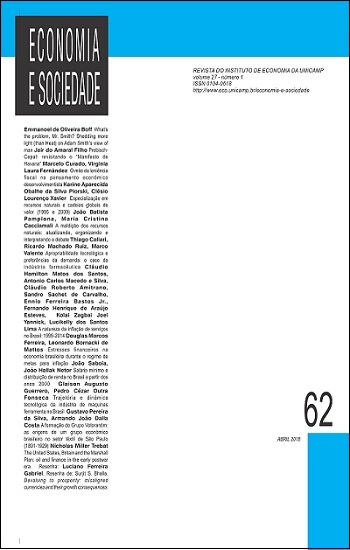Abstract
Qual a razão das recentes discussões sobre o “Adam Smith Problem” na literatura? Embora a maioria dos historiadores do pensamento econômico considere o problema resolvido, estas discussões põem em dúvida esta suposta resolução. Este artigo sugere que o “Adam Smith Problem” pode ter como origem o conceito de ser humano desenvolvido por Smith na “Teoria dos Sentimentos Morais”: neste livro, os seres humanos podem ser compreendidos como compostos de uma parte empírica e outra (quase) transcendental, na figura do espectador imparcial. Argumenta-se no artigo que é a tensão entre estas duas partes do ser humano que gera supostas inconsistências entre determinados aspectos da “Teoria dos Sentimentos Morais” e da “Riqueza das Nações”, como, por exemplo, o papel da simpatia e do auto-interesse em cada um destes livros.References
ALVEY, J. Adam Smith: optimist or pessimist? A new problem concerning the teleological basis of commercial society. Hants: Ashgate Publishing, 2003.
ANSPACH, R. The implications of the theory of moral sentiments for Adam Smith’s economic thought. History of Political Economy, v. 4, n. 1, p. 176-206, 1972.
ASHRAF, A. et al. Adam Smith, behavioral economist. In: LOEWENSTEIN, G. Exotic preferences. New York: Oxford University Press, 2008.
BOWLES, S.; GINTIS, H. A cooperative species: human reciprocity and its evolution. Princeton: Princeton University Press, 2011.
BOWLES, S.; POLANÍA-REYES, S. Economic incentives and social preferences: substitutes or complements? Journal of Economic Literature, v. 50, n. 2, p. 368- 425, 2012.
BROWN, V. Adam Smith’s discourse: canonicity, commerce and conscience. London; New York: Routledge, 1994.
BROWN, V. Agency and discourse: revisiting the Adam Smith problem. In: THE ELGAR Companion to Adam Smith. Northampton: Edgar Elgar Publishing, 2009.
CAMPBELL, T. D. Adam Smith’s science of morals. New York: Routledge, 1971.
CAMPBELL, R. H.; SKINNER, A. S. (Eds.). The Glasgow edition of the works and correspondence of Adam Smith in seven volumes. Indiana: Liberty Fund, 1982 [1976].
DAVIS, J. The theory of the individual in economics: identity and value. New York: Routledge, 2003.
DICKEY, L. Historicizing the “Adam Smith problem”: conceptual, historiographical, and textual issues. The Journal of Modern History, v. 58, n. 3, p. 579-609, Sept., 1986.
EVENSKY, J. Adam Smith’s moral philosophy: a historical and contemporary perspective on markets, law, ethics and culture. Cambridge: Cambridge University Press, 2005.
FLEISCHACKER, S. On Adam Smith’s wealth of nations: a philosophical companion. Princeton: Princeton University Press, 2004.
FLEISCHACKER, S. Adam Smith and cultural relativism. Erasmus Journal for Philosophy and Economics, v. 4, n. 2, p. 20-41, Autumn 2011,
FORMAN-BARZILAI, F. Adam Smith and the circles of sympathy: cosmopolitanism and moral theory. Cambridge: Cambridge University Press, 2011.
FOUCAULT, M. The order of things. New York; London: Routledge: 2001.
FOUCAULT, M. O nascimento da biopolítica. Curso no College de France, 1978- 1979. São Paulo: Martins Fontes, 2008.
GINTIS, H. et al. Moral sentiments and material interests: the foundations of cooperation in economic life. Cambridge: MIT Press, 2005.
GRISWOLD, C. Adam Smith and the virtues of enlightenment. Cambridge: Cambridge University Press, 1998.
HAAKONSSEN, K. The science of a legislator: the natural jurisprudence of David Hume and Adam Smith. Cambridge: Cambridge University Press, 1989 [1981].
HAAKONSSEN, K. Natural law and moral philosophy: from Grotius to the scottish enlightenment. Cambridge: Cambridge University Press, 1996.
KHALIL, E. Smith the Hedgehog. In: BROWN, V. (Ed.) The Adam Smith review. New York: Routledge, 2006. v. 2, p. 3-21.
MONTES, L. Das Adam Smith problem: its origins, the stages of the current debate, and one implication for our understanding of sympathy. In: MONTES, L. New perspectives on Adam Smith. New York: Palgrave, 2004.
OTTESON, J. R. Adam Smith’s marketplace of life. Cambridge: Cambridge University Press, 2002.
PAGANELLI, M. P. The Adam Smith problem in reverse: self-interest in the wealth of nations and in the theory of moral sentiments. History of Political Economy, v. 40, n. 2, p. 365-82, 2008.
RAPHAEL, D. D.; McFIE, A. L. Introduction to the theory of the moral sentiments. In: CAMPBELL, R. H.; SKINNER, A. S. (Eds.). The Glasgow edition of the works and correspondence of Adam Smith in seven volumes. Indiana: Liberty Fund, 1982 [1976]. v. 1.
RAPHAEL, D. D. The impartial spectator: Adam Smith’s moral philosophy. Oxford: Oxford University Press, 2007.
TEICHGRAEBER III, R. Rethinking das Adam Smith problem. Journal of British Studies, v. 20, n. 2, p. 106-123, Spring 1981.
VINER, J. Adam Smith and laissez faire. Journal of Political Economy, v. 35, n. 2, p. 198-232, Apr. 1927.
VINER, J. Adam Smith. In: SILLS, David L. (Ed.) International Encyclopedia of the Social Sciences, 1968. v. 14, p. 322-329.
WINCH, D. Adam Smith’s politics: an essay in historiographic revision. New York: Cambridge University Press, 2008 [1978].
A Economia e Sociedade utiliza a licença do Creative Commons (CC), preservando assim, a integridade dos artigos em ambiente de acesso aberto.

